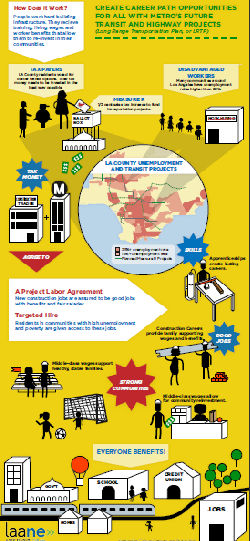Earlier today, the Metro Board of Directors unanimously passed a motion creating a "construction careers program" that will require that at least 40% of workers on Metro projects come from disadvantaged communities. Streetsblog wrote about the program this week. The program was approved by the Federal Transit Administration after negotiations with local labor unions.
Insuring that the construction boom promised by Measure R benefits workers of lesser means has been a priority for community and advocacy groups. Federal law prohibits requirements designating geographic area hiring policies, but does allow agencies to create hiring policies that benefit "disadvantaged communities" more generally.
"Some people think that Measure R is only about transit, but it can be about a lot more," testified Denny Zane, the executive director of Move L.A. "“Building Measure R projects are good jobs. This is a very important step you can take today."
Zane kicked off a public comment period which saw nobody rise in opposition to the motion and a parade of speakers from all parts of L.A. County testifying what this policy could mean to their careers and their communities. The closest thing to opposition was a few comments from the Bus Riders Union that praised the program itself, but wished that it were going to support different projects than the Measure R rail projects.
"You have the chance today to stand on the right side of history," testified the BRU's Esperanza Martinez urging a "yes" vote. But earlier in the process BRU members urged the unions that supported the Careers Construction Program to also support bus programs that will help workers get to their jobs.
The Board itself engaged in no debate and passed the motion by a vote of accalamation. According to Los Angeles Alliance for a New Economy’s analysis of similar policies at other agencies such as the Port of Long Beach, the Expo Construction Authority (for Phase II) and the Community Redevelopment Agency (CRA), this program could provide job access for 23,000 Los Angeles County residents of lesser means.





